What is a Well Pump?
A well pump — the heart of a well water system — is a mechanical device submerged in the well that draws water from the ground and pushes it into your home’s plumbing system. Essential for those relying on well water, it ensures a steady supply for drinking, cleaning, and other household needs. Depending on your property, there are two types of well pumps.
Shallow Well Pumps
Shallow well pumps are designed for wells where the water level is relatively close to the surface, typically within 25 feet. They are commonly used in residential settings and for small-scale irrigation systems. These pumps work by creating suction to pull water up from the well and then pushing it into the plumbing system.
Deep Well Pumps
Deep well pumps are designed to draw water from wells where the water table is located at a significant depth, typically beyond 25 feet. These pumps are commonly used in residential, commercial, and agricultural settings where access to deeper groundwater sources is necessary.
Have specific questions? Check out our FAQ or give us a call today!
Service Details
Diagnosing whether your well pump requires repair or replacement involves several factors.
- Age of the pump
- Frequency and severity of issues
- Cost of repair vs. replacement
- Water quality and quantity issues
- Energy efficiency
- Availability of parts
Common Questions About Boilers and the Answers
There is a $96 service fee per visit. If any repair or service is carried out at the time of the appointment, the service fee is waived.
You can also enjoy year-round peace of mind and savings with our exclusive bluefrog membership plan:
Elite Membership
- 15% Member Savings
- $96 service fee waived (unlimited free estimates)
- Priority Scheduling for all service calls
- Annual SHAPE Assessment. (Safety, Health, and Performance Evaluation)
- 5 yr warranty on all parts and labor with active membership
- Max savings of $150
- Warranty is a rolling warranty of 5 years with active membership from the date of work performed/installation of product) NO WARRANTY ON STOPPAGES
- Customer is responsible for scheduling the annual plumbing assessment
- Residential Service Only (Multi Properties Owned by Customer in Service Area)
*Product must be supplied by Our Company
*Water pressure in the home cannot exceed 80 PSI
*Water quality meets minimum standards
*No neglect or abuse of fixtures
Your membership is ongoing and will automatically renew each year on or around the anniversary of your original sign-up date.
Your account will be automatically charged annually using the payment method on file.
Elite Membership
- 15% Member Savings
- $96 service fee waived (unlimited free estimates)
- Priority Scheduling for all service calls
- Annual SHAPE Assessment. (Safety, Health, and Performance Evaluation)
- 5 yr warranty on all parts and labor with active membership
- Max savings of $150
- Warranty is a rolling warranty of 5 years with active membership from the date of work performed/installation of product) NO WARRANTY ON STOPPAGES
- Customer is responsible for scheduling the annual plumbing assessment
- Residential Service Only (Multi Properties Owned by Customer in Service Area)
*Product must be supplied by Our Company
*Water pressure in the home cannot exceed 80 PSI
*Water quality meets minimum standards
*No neglect or abuse of fixtures
Your membership is ongoing and will automatically renew each year on or around the anniversary of your original sign-up date.
Your account will be automatically charged annually using the payment method on file.
Yes, we do! Check out our Membership Plans page to see which tier is best for you and what you’ll get.
Yes, we do! Check out our Membership Plans page to see which tier is best for you and what you’ll get.
- Schedule routine maintenance and inspections.
- Install a water filtration or treatment system if needed.
- Protect the well from surface contamination.
- Use water efficiently to prevent overuse and strain on the system.
- Ensure proper drainage around the well to prevent flooding and contamination. (9)
- What are the most common issues that come up with wells?
- Low water pressure due to pump failure, clogged pipes, or sediment buildup.
- Water contamination from bacteria, iron, or other contaminants.
- Air in the plumbing system causing sputtering faucets.
- Well pump cycling on and off frequently, indicating pressure switch issues.
- Well running dry due to drought or overuse.
- In Connecticut, well owners must comply with state well construction and maintenance regulations set by the Department of Public Health (DPH).
- New wells must be drilled by a licensed professional.
- Certain areas may require water testing for real estate transactions or compliance with state standards.
- Abandoned wells must be properly sealed.
- Keep hazardous chemicals away from the well.
- Ensure the well cap is secure and intact.
- Keep the area around the well clean and free of debris.
- Regularly inspect and service the well and pump system.
- Test water quality annually and treat if necessary.
- Signs you have a well:
- A well cap or casing visible in your yard.
- No monthly water bill from a municipal provider.
- A pressure tank inside your home.
- Your property has a well record from the state.
- You should test well water at least once a year, but more frequently if you notice changes in taste, color, or smell.
- Regular testing is essential because:
- Bacteria and nitrates can enter the well from surface contamination, especially after heavy rain or flooding.
- pH and mineral levels fluctuate over time, affecting plumbing and water quality.
- Nearby construction or land use changes can introduce new contaminants.
- Health risks: Contaminated water can cause stomach issues, neurological problems, or long-term health effects.
- A basic annual test should check for bacteria, nitrates, pH, and minerals. More in-depth tests may be needed based on location and previous water quality results.
- Brown well water can be caused by several factors, each requiring different actions:
- Iron or manganese buildup: Common in wells, especially if water sits in pipes too long. Solution: Install an iron filter or water softener.
- Sediment or rust: Caused by corroded pipes or well casing. Solution: Flush the system and inspect for pipe damage.
- Organic material or bacteria: Can enter through cracks in the well or after heavy rainfall. Solution: Test for contamination and disinfect the well if necessary.
- Recent well work or repairs: Disturbances can temporarily introduce sediment into the water. Solution: Run the water for several hours to clear it.
- Testing the water is important to determine the cause before taking corrective action.
- Well pumps typically last 10 to 15 years, but their lifespan depends on:
- Usage: High water demand can wear out a pump faster.
- Pump type: Submersible pumps last longer (10-15 years) than jet pumps (7-10 years).
- Water quality: Hard water or sediment can wear down pump components.
- Signs you may need a replacement:
- Low or inconsistent water pressure.
- Spitting or sputtering faucets.
- Increased energy bills (a failing pump has to work harder).
- Pump runs constantly or cycles too frequently.
- Replacing a failing pump before it completely breaks down prevents total water loss and potential damage to the system.
- A well typically lasts 30 to 50 years, but this depends on factors like:
- Ground conditions: Some areas have more corrosive soil or water, which can shorten the well’s lifespan.
- Well depth and construction: Deeper wells generally last longer as they tap into more stable groundwater sources.
- Water usage: Excessive water use can strain the well and pump, leading to earlier failure.
- Maintenance: Regular testing and servicing can extend a well’s lifespan by preventing major issues before they worsen.
- A well should be serviced at least once a year to ensure it is functioning properly and to catch potential problems early.
- Annual servicing includes checking the pump, pressure tank, electrical components, and well cap for damage or wear.
- Regular maintenance helps prevent sudden failures, which can be costly and leave you without water.
- Bacteria, sediment, and contaminants can build up over time, so servicing ensures the water remains safe for drinking and household use.
Tailor-made for those of you who have rental properties or family in the area who want to go in on a membership together.
You’ll get:
- 15% Member Savings
- $96 service fee waived (unlimited free estimates)
- Annual plumbing assessment*
- 5-year warranty on all parts and labor with active membership**
- Max savings of $300
- Residential Service Only (multiple properties) within our service area
Ideal for anyone who wants top-notch, guaranteed service under warranty to keep their home plumbing systems working perfectly.
You’ll get:
- 15% Member Savings
- $96 service fee waived (unlimited free estimates)
- Annual plumbing assessment*
- 5-year warranty on all parts and labor with active membership**
- Maximum savings of $300
- Residential Service Only (one location)
Perfect for homeowners who want to protect their investment and ensure they’re always covered when it comes to plumbing needs.
You’ll get:
- 10% member savings
- $96 service fee waived (unlimited free estimates)
- Annual plumbing assessment*
- Max savings of $300 per line item
- Residential service only (one Location)
Absolutely, we would not be fully licensed, insured, and bonded if we weren’t!
We accept cash, checks, and any major credit cards. We also offer financing!
No. We understand that plumbing emergencies can happen anytime, so we’re proud to offer our standard rates for service calls, even during evenings and weekends. Your peace of mind and satisfaction are our top priorities.
Check out any of our reviews or testimonials!
We strive to provide same day service as we understand the urgent manner of most plumbing needs.
We stand behind our work and guarantee your satisfaction. Our professional staff is ready to answer your questions, educate you on your plumbing issues, and ensure that you are comfortable with the decisions you make. It’s the bluefrog way. Ask us about our available 5-year Warranty!
A standard trip charge of $96.00 applies to Non-Members, Commercial Clients, and Rental Properties. First-time residential customers and Members are eligible for a waived trip charge. The trip charge is also waived if you choose to proceed with the estimate provided during the technician’s visit. Payment is due at the time of service.
Yes. We are fully licensed, bonded, certified, and insured.
Factors affecting cost:
- Severity of the issue: A small leak is less expensive than a major pipe burst.
- Accessibility of the pipe: If the pipe is hidden behind walls or underground, it will cost more to access and repair.
- Type of pipe: Certain materials like copper are more expensive than PVC.
Estimated costs:
- Minor leak repair: $250-$400+
- Moderate leak repair: $400-$1,000+
- Extensive repair or replacement: $1,000-$4,000+
Additional costs:
- Emergency service: If you need a plumber after hours or on weekends, expect to pay a premium.
- Materials: The cost of replacement pipes, fittings, and other materials will vary depending on the type and quantity needed.
- Permits: In some cases, you may need a permit for pipe repairs, which will add to the overall cost.
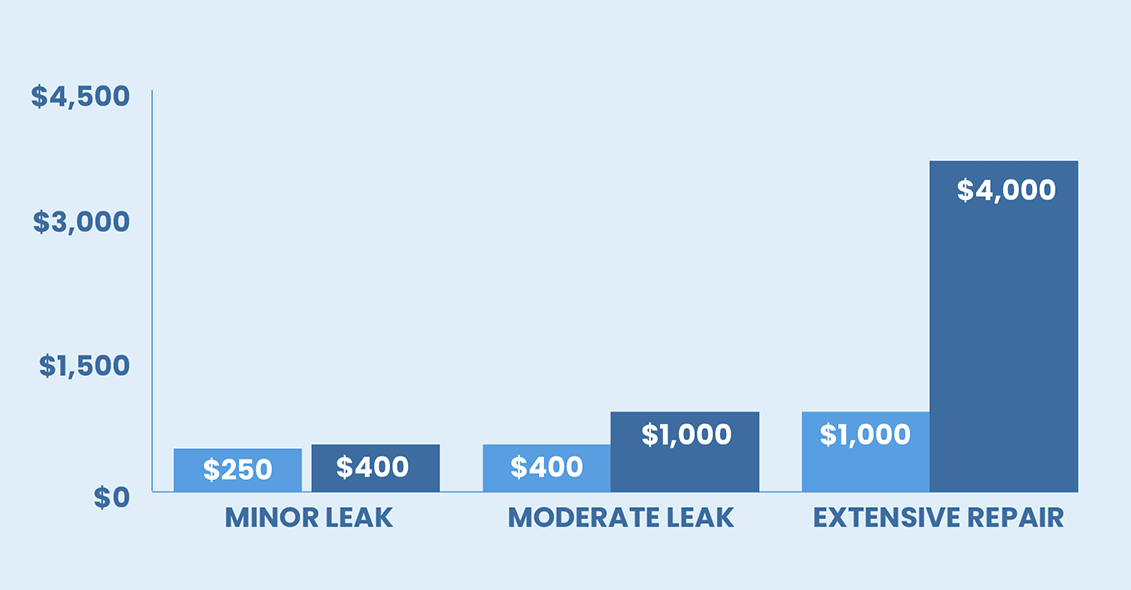
What to expect during pipe replacement:
Pipe removal: The old, damaged pipe will be carefully removed. If the pipes are hidden, this may involve cutting into walls or floors.
New pipe installation: The new pipe will be installed, and proper connections and secure fittings ensured.
Testing: The new pipe will be tested to confirm that it’s watertight and functioning correctly.
Cleanup and restoration: The plumber will clean up the work area.
Note: Water will be shut off during this process. If cutting sheetrock or walls open is necessary, your plumber will refer you to a recommended professional to repair any damaged walls or ceilings during the replacement process.
What to expect during pipe repair:
- Inspection: A plumber will identify the damaged section of the pipe and determine the cause of the issue.
- Preparation: The area around the pipe will be cleared and prepped for repair. This may involve shutting off the water supply.
- Repair work: The plumber will use various methods like patching, sealing, or pipe lining to fix the damaged section, depending on the severity of the problem and the type of pipe.
- Testing: After the repair, the plumber will test the pipe to ensure it’s leak-free and functioning correctly.
To prepare for pipe repair or replacement, locate and turn off the main water supply to your house. Then, clear the work area around the pipes to give our plumber easy access. Gather any relevant information about your plumbing system, like blueprints or past repair records.
Signs that your pipes might need repair include:
- Visible leaks, cracks, or bulging in pipes or around walls.
- Unexplained water pressure drops affecting a single faucet or fixture, discolored water.
- Strange noises coming from your pipes could also indicate a need for repair.
Signs that your pipes might need replacement include:
- Extensive leaks or cracks that cannot be easily repaired.
- Frequent repairs or recurring leaks in the same pipe section.
- Discolored water throughout the house, indicating widespread corrosion.
The cost is influenced by the type and quality of materials used, the complexity of the project (simple replacement vs. complete conversion), labor costs, and any additional features like custom tiling or upgraded fixtures.
The cost of a new tub or shower can vary widely depending on the type, material, brand, size, features, and complexity of the installation. Here’s a general breakdown of the average costs you can expect:
Tub:
- Acrylic tub: Most popular and budget-friendly option
- Fiberglass tub: Lightweight and affordable
- Porcelain-enamel steel tub: A durable and classic look
- Cast iron tub: Heavy and long-lasting, but higher cost
- Stone resin tub: Luxurious and customizable
Shower:
- Prefabricated shower stall: Easy to install, various styles available
- Custom tiled shower: Highly customizable, but higher cost
- Walk-In shower: Accessible and stylish
Additional costs:
- Installation: Varies based on complexity and location
- Faucets and fixtures: $250-$1,000+
- Plumbing modifications: $200-$1,000+ (if needed)
Overall estimated costs:
- Replacing a tub: $8,000-$9,000+ (including tub, installation, and potential additional costs)
- Replacing a shower: $8,000-9,000+ (including shower, installation, and potential additional costs)
- Tub to shower conversion: $9,500+ (including removal of tub, shower installation, and potential additional costs)
Tips for saving money:
- Choose a standard size: Custom sizes often come with higher price tags.
- Opt for simpler materials: Tile and stone are beautiful but expensive. Consider acrylic or fiberglass for a more budget-friendly option.
- DIY installation (if experienced): Installing a prefabricated shower stall or acrylic tub can save labor costs.
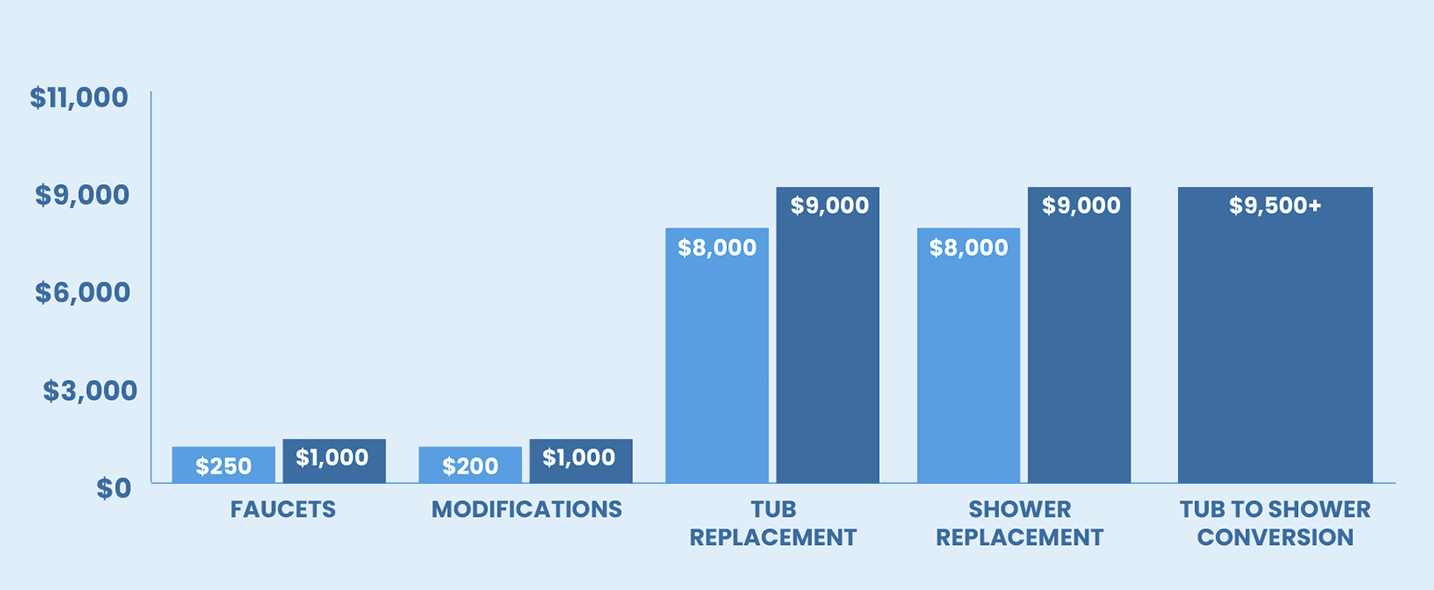
The process will vary depending on the specific work being done. However, here’s a general overview of what you can expect:
Conversion (Tub to Shower):
- Removal of the tub: The old tub and any surrounding tiles or materials will be carefully removed.
- Plumbing adjustments: The plumbing will be modified to accommodate the new shower configuration.
- Shower pan installation: A new shower base or pan will be installed and leveled.
- Wall installation: Shower walls (tile, acrylic, or other material) will be installed and sealed.
- Fixtures and accessories: The shower head, faucet, handles, and additional accessories (e.g., grab bars and shelves) will be installed.
Repair:
- Assessment: A plumber will assess the damage and determine the necessary repairs.
- Repair work: Depending on the issue, the plumber may fix leaks, replace damaged tiles, re-grout, or repair/replace faucets or fixtures.
- Testing: The repaired area will be tested to ensure it functions properly.
Replacement:
- Removal of old fixture: The old tub or shower and any associated tiles or materials will be removed.
- Preparation: The area will be prepped for the new installation.
- New fixture installation: The new tub or shower will be installed and connected to the plumbing.
- Finishing touches: Tiles, surrounds, faucets, and other accessories will be installed to complete the project.
General considerations:
- Timeline: The duration of the project depends on its complexity. Repairs can often be done in a day or two, while conversions or replacements can take longer.
- Disruption: Expect some disruption to your bathroom during the process. The area may be unusable for a few days.
- Cost: Costs vary depending on the type of work, materials chosen, and your location.
- Permits: Check with your local building department to see if permits are required for your project.
Remember to communicate your preferences and budget with your chosen professional to ensure the final result meets your expectations.
Clear the area around the tub or shower, remove personal items, and gather necessary materials like towels or drop cloths. When your plumber arrives, please be ready to describe the issue and have any age, model information, or warranty details available.
The lifespan of a tub or shower varies depending on the material and maintenance. Generally, acrylic and fiberglass tubs last 10-15 years, while porcelain-enamel steel and cast iron can last decades with proper care.
If you notice leaks, cracks, poor drainage, inconsistent temperatures, low water pressure, or visible rust/damage, it’s a sign you might need repairs. However, if the damage is extensive, repairs are frequent, or your fixtures are outdated, a complete replacement might be a more practical and aesthetically pleasing long-term solution.
Length of the line: The longer the line, the more expensive it will be due to increased materials and labor.
Complexity of the installation: The cost will increase if the line needs to navigate obstacles or requires extensive digging.
Type of pipe: Different pipe materials (e.g., black steel, copper, CSST) have varying costs.
Permits and inspections: Local regulations may require permits and inspections, adding to the overall cost.
Location: Labor costs can differ significantly depending on where you live.
Estimated Costs:
- Running a gas line from an existing connection: $360-$740
- Adding a new pipe from the meter: $500-$3,000 or more
- Converting to natural gas or installing a new line from the street: $2,000+
Additional costs:
- Permits and inspections: These can range from $50 to several hundred dollars.
- Landscaping repair: If the installation requires digging up your yard, you might need to factor in landscaping costs.
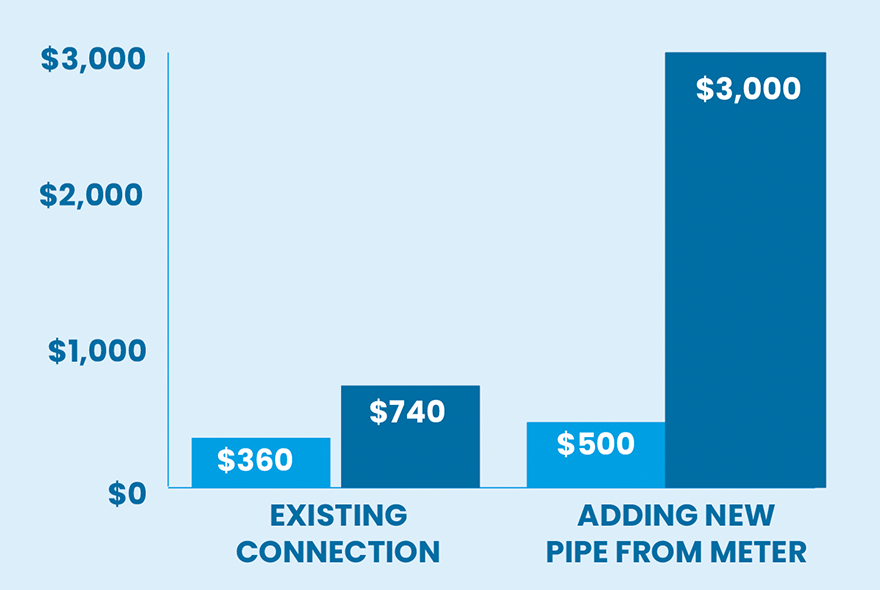
During the service call:
- Inspection: The technician will assess the gas line, looking for leaks, corrosion, or other damage. They may use specialized tools like gas detectors or perform pressure tests.
- Diagnosis: The technician will explain the issue and the recommended action (repair or replacement).
- Repair or replacement:
- Repair: Minor leaks or damaged sections may be repaired with clamps, patches, or new fittings.
- Replacement: Extensive damage or outdated materials may require replacing the entire line or sections. The technician will disconnect the gas supply, remove the old pipe, and install new, compliant piping.
- Testing: After the repair or replacement, the technician will conduct thorough tests to ensure the line is leak-free and safe. This may include pressure tests and using a gas detector.
- Clean-up: The technician will clean the work area and remove debris or old materials.
- Final inspection: A final inspection will ensure the work meets all safety codes and regulations.
After the service call:
- Review and payment: You’ll review the work with the technician, receive any necessary documentation, and make payment.
- Maintenance tips: Ask the technician for tips on maintaining your gas lines to prevent future issues.
Additional considerations:
- Permits: In some areas, permits may be required for gas line work. The technician should be able to advise you on this.
- Appliance reconnection: If appliances are disconnected, the technician will reconnect them and ensure they operate safely.
- Gas leak education: The technician may provide information on identifying gas leaks and what to do in an emergency.
By understanding the process and taking necessary precautions, you can ensure a safe and successful gas line installation, repair, or replacement.
Before a technician arrives, clear access to the gas line and relevant appliances. Note down any symptoms you’ve noticed, like the smell of gas or hissing sounds. If you suspect a leak, evacuate immediately and call your gas company or local emergency services.
The lifespan of a gas line depends on the material it’s made of:
- Depending on soil conditions and maintenance, black steel pipes can last 50 to 100 years.
- Galvanized steel pipes: These typically last 20-50 years but are prone to corrosion and are no longer used for new installations.
- Copper pipes can last 50 years or more with proper installation and maintenance.
- Corrugated Stainless Steel Tubing (CSST): These newer flexible gas lines typically last 30 years or more.
*We recommended that you have your gas lines inspected every 2-3 years.
If you smell gas, hear hissing sounds near gas lines, see dying plants, which might indicate buried lines, or notice higher gas bills, these are vital signs you need a professional inspection. A qualified technician can accurately diagnose the issue and determine if repair or replacement is necessary.
Aside from the equipment needed, the geographic location of the pump, labor, brand and quality, and depth all factor into the cost of a new well pump.
The cost of a new well pump can vary significantly depending on the type needed:
- Shallow well pumps: These are typically less expensive, ranging from $1,200 to $1,600 or more.
- Deep well pumps: These are more complex and powerful, costing between $500 to $5,000 or more.
- Submersible pumps (deep well): These are more expensive than jet pumps, ranging from $1,600 to $4,000 or more.
- Jet pumps (shallow or deep well): These are usually less expensive than submersible pumps, costing between $1,200 to $1,600 or more.
- Constant pressure systems: These provide consistent water pressure and can range from $2,500 to $5,000 or more.
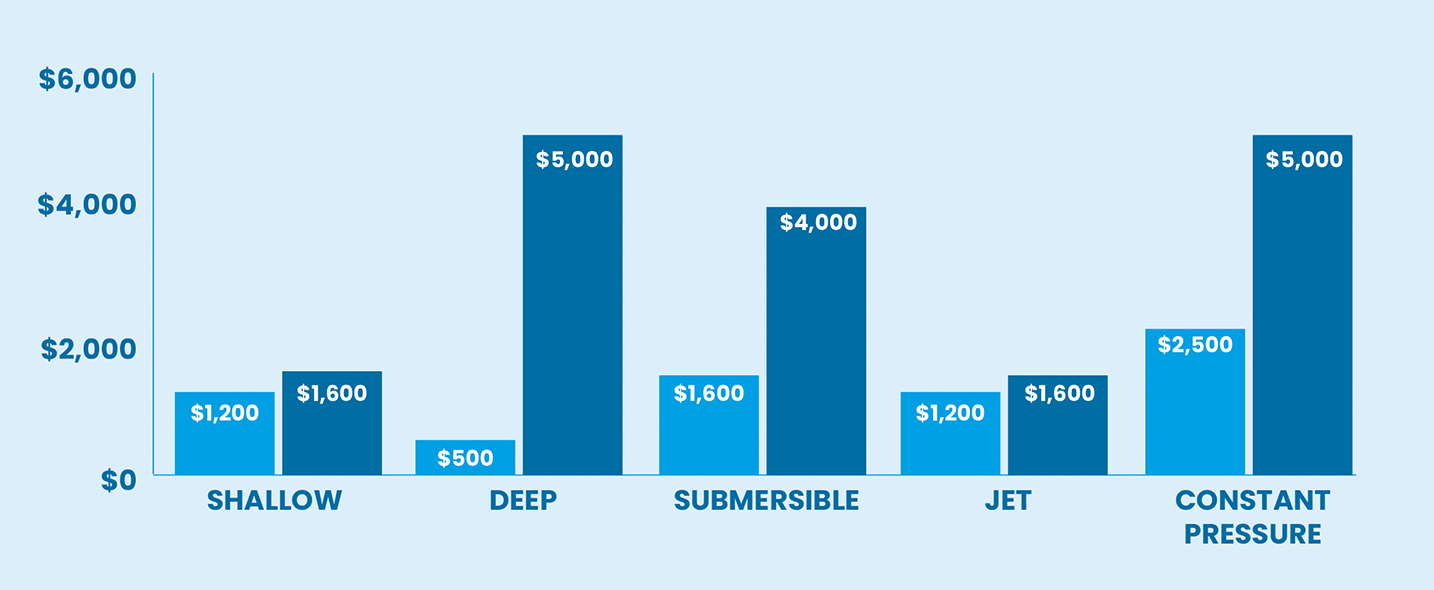
Well pump services involve diagnosing the issue, repairing or replacing components, and ensuring proper functionality. Whether it’s fixing a minor leak or installing a new pump, your technician will assess the situation and recommend the best course of action based on the pump’s age, condition, and your specific water needs. The process may leave you without water for the duration of the process, and costs can vary depending on the complexity of the job and your location.
Before your technician arrives, note your pump’s details and any past repairs. Clear the area around the pump and locate your electrical panel. Describe the issues you’re experiencing, noting when they began. If needed, arrange a backup water source and keep pets and children away from the work area.
Shallow well pumps: These typically last 8-10 years, but can sometimes last up to 15 years with proper maintenance.
Deep well pumps: These usually have a longer lifespan, ranging from 15 to 25 years, with submersible pumps often lasting longer than jet pumps, which are non-submersible pumps that use a high-velocity jet of fluid to create a vacuum and move a large amount of fluid.
However, the frequency of use, quality of the equipment, water quality, and lack of attention to maintenance can shorten the life of your well pump.
Deciding whether repair or replacement is best for you depends on the severity of your issue:
Minor issues: If the problem is a minor one, like a faulty pressure switch or a clogged filter, repair is usually the most cost-effective solution.
Major issues or old age: If the pump is old, has multiple issues, or requires expensive repairs, replacing it with a newer, more efficient model is likely the better option.
Several factors can significantly impact the cost of a boiler or combination boiler, including:
- Type of boiler:
- Combination boilers (combi): Typically more expensive than traditional boilers due to their compact design and ability to provide both heating and hot water on demand.
- Conventional boilers: Less expensive upfront, but require a separate hot water cylinder, adding to overall installation space and potentially increasing costs.
- System boilers: Similar to conventional boilers but with some components built in, offering a middle-ground in terms of price.
- Brand and model:
- Premium brands: Often come with higher price tags due to reputation, advanced features, and longer warranties.
- Basic models: More affordable but might lack some of the features and efficiency of premium models.
- Size and capacity:
- BTU output: The boiler’s heating capacity, measured in British Thermal Units (BTUs), directly affects the price. Larger homes require boilers with a higher BTU output, which are more expensive.
- Flow rate: For combi boilers, the flow rate, measured in gallons per minute (GPM), determines how much hot water the boiler can deliver simultaneously. Higher flow rates are usually associated with higher prices.
- Fuel type:
- Gas boilers: Generally the most common and cost-effective option in areas with natural gas infrastructures.
- Oil boilers: Less common and usually more expensive than gas boilers.
- Electric boilers: Often the most expensive option due to higher electricity costs.
- Installation complexity:
- Existing system: If your system is outdated or complex, it might require additional modifications, which will increase installation costs.
- Location: Installing a boiler in a difficult-to-reach location or requiring extensive pipework can add to the labor costs.
- Additional features and upgrades:
- Smart Controls: Boilers with smart thermostats or app controls offer convenience but can add to the overall cost.
- Condensing Technology: High-efficiency condensing boilers are more expensive upfront but can save money on energy bills in the long run.
Warranty: Longer warranties often come with a higher initial price but provide peace of mind and potential savings on future repairs.
Traditional boiler: $9,500-13,500 (unit and installation)
Combination boiler: $10,000-14,500 (unit and installation)
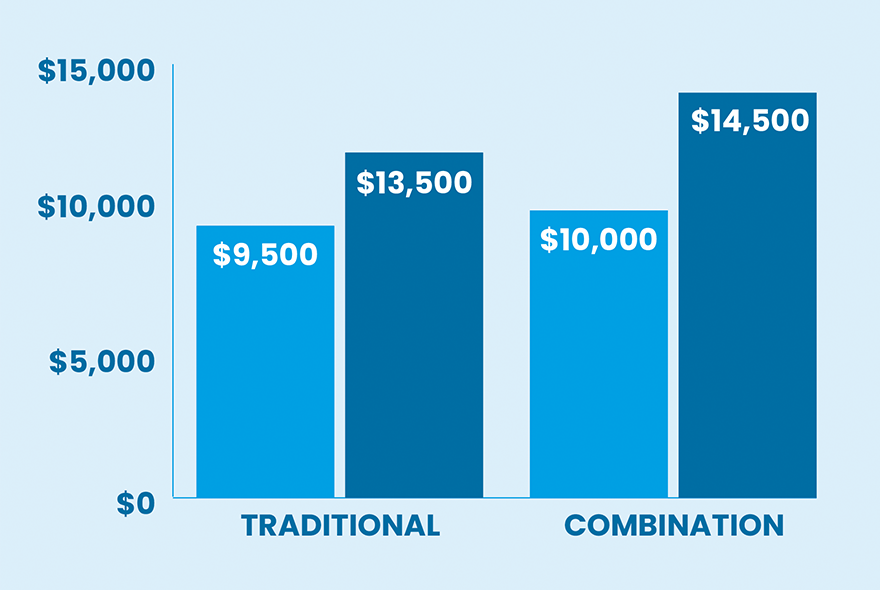
Here’s what you can generally expect during boiler repair or replacement:
Repair:
- Inspection: A qualified technician will thoroughly inspect your boiler to diagnose the issue. They may run tests, check for leaks, and examine internal components.
- Diagnosis: The technician will explain the problem and recommend the necessary repairs.
- Repair work: Depending on the issue, the technician may replace parts, fix leaks, clean components, or adjust settings.
- Testing: After the repairs are complete, the technician will test the boiler to ensure it’s working correctly and safely.
- Clean-up: The technician will meticulously clean up the work area before leaving.
Replacement:
- Assessment and quote: The technician will assess your home’s heating needs and recommend a suitable replacement boiler. You’ll receive a written estimate outlining the costs.
- Scheduling: You’ll schedule a convenient time for the replacement, which may take a few hours or a full day depending on the complexity.
- Old boiler removal: The technician will safely disconnect and remove your old boiler responsibly.
- New boiler installation: The new boiler will be installed, connected to the existing pipework, and tested.
- System flushing: If necessary, the technician may flush the system to remove debris and ensure optimal performance.
- Explanation and demonstration: The technician will explain how the new boiler works and demonstrate its controls.
- Clean-up: The work area will be meticulously cleaned up.
General considerations:
- Timeline: Repairs can often be completed in a few hours, while replacements might take longer depending on the complexity.
- Disruption: Expect some disruption to your hot water and heating during the process.
- Cost: Repairs are generally less expensive than replacements, but a new, more efficient boiler can be a worthwhile investment in the long run.
- Safety: Ensure the technician you hire is qualified and licensed to work on boilers.
- Warranty: Inquire about warranties on parts and labor for both repairs and replacements.
Before the technician arrives:
- Gather information:
- Boiler model and age: Make note of the make, model, and age of your boiler. This information will be helpful for the technician.
- Maintenance records: If you have any past service records, collect them to provide context for the current issue.
- Warranties: Check if your boiler is still under warranty, as it might cover repair or replacement costs.
- Clear access:
- Boiler location: Make sure the area around the boiler is clear of any obstacles, providing easy access for the technician.
- Water and gas shut-off: Locate the water and gas shut-off valves for the boiler. These might need to be turned off during the repair or replacement.
- Note symptoms:
- Problems observed: Clearly describe the issues you’ve experienced with the boiler, including any unusual noises, leaks, error codes, or changes in performance.
- Timeline: Note when the problems started and how they have progressed over time.
This information can help the technician diagnose the issue quicker, and having the area clear will also save you time and money.
Traditional boilers (conventional or system boilers): These typically last 10-15 years, but with good maintenance, they can sometimes reach 20 years or more.
Combi boilers: These also have an average lifespan of 10-15 years, but newer models with high-efficiency condensing technology might have slightly shorter lifespans of around 12-15 years.
Several signs can indicate your boiler needs repair or replacement. Here are some key things to look for and consider:
Signs your boiler might need repair:
- Leaks and unusual noises
- Persistent pilot light issues
- Lack of water pressure
- Thermostat issues
Signs your boiler might need replacement:
- Age (they last 10-15 years on average)
- Frequent repairs
- Rising energy bills
- Carbon monoxide leak
- Outdated model (parts may be unavailable)
*Remember, boilers involve gas and water, so it’s crucial to prioritize safety and consult a professional if you have any concerns.
The cost of a water treatment system varies greatly depending on the type, brand, complexity, and features, but it can range from a few hundred dollars for basic filtration systems, to several thousand dollars for whole-house systems with advanced technology like reverse osmosis.
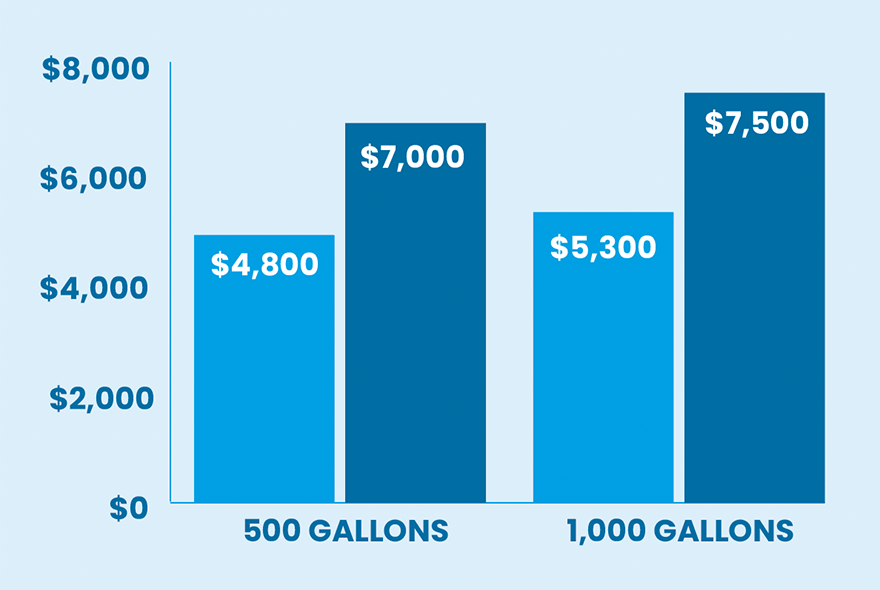
During a water treatment system installation, repair, or replacement, a technician will assess your water needs, recommend the best solution, install or fix the equipment, test the water quality, and explain how to maintain the system for optimal performance.
Gather the following information to streamline the repair or replacement process:
- System type: Know whether you have a water softener, filter, reverse osmosis system, etc.
- Brand and model: This helps the technician identify parts and specifications.
- Age of the system: Knowing how old it is can guide decisions on repair vs. replacement.
- Maintenance history: Share any recent maintenance or repairs performed.
- Observed problems: Describe any issues you’ve noticed with the water or system.
Day of: Be sure the area around your system is clear and there is a path to access tools and new equipment.
Water softener systems prevent scale buildup in pipes and appliances, extending their lifespan, and improving the effectiveness of soaps and detergents, leading to softer skin, brighter laundry, and less soap scum buildup.
The lifespan of a water softener system varies depending on the type and usage, but on average, with proper maintenance, it can last between 10 and 20 years.
You’ll likely need to repair or replace your water treatment system if you notice your water quality deteriorating, or if the system is malfunctioning, leaking, or making unusual noises.
- Type of Heater: Traditional tank water heaters are generally less expensive than tankless models. Tankless heaters, however, offer long-term savings on energy bills and the lifetime value of the equipment.
- Size and Capacity: Larger tank water heaters and higher-capacity tankless units cost more. The size needed depends on household water usage.
- Fuel Source: Electric water heaters are usually less expensive upfront than gas models, but gas heaters can be more economical in the long run due to lower energy costs.
- Energy Efficiency: Higher efficiency models, including those with better insulation and advanced heating technologies, tend to be more expensive but offer savings on energy bills.
- Installation Complexity: The cost can vary based on the job’s complexity. Replacing an existing water heater is typically less expensive than installing a new type or relocating the unit, which may require additional plumbing, electrical, or gas line work.
- Brand and Quality: Premium brands and models with advanced features or longer warranties can cost more but often provide better reliability and performance.
- Permits and Regulations: In some areas, permits and inspections are required for installation, adding to the overall cost. Local building codes may also affect the installation process and expenses.
The average cost of a new water heater, including installation, in Connecticut varies depending on the type and size of the unit.
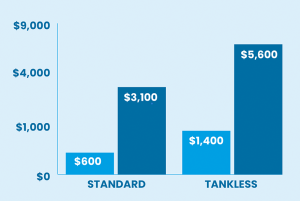
When we repair or install your water heater, we take care to minimize disruption to your home. We may need to cut sheetrock or drill through beams, rafters, or walls to access plumbing or electrical connections. Still, we aim to do so with minimal damage and will discuss any significant alterations with you beforehand. We strive to ensure a smooth installation or repair process while keeping your home intact and clean.
Repair: We can usually repair minor issues, such as a faulty thermostat, heating element, or minor leaks.
Replacement: If the tank is corroded, the unit is near the end of its lifespan (8-12 years for traditional heaters, 15-20 years for tankless), or if the repair costs are high, it might be more cost-effective to replace the unit.
To prepare your home for a water heater installation, clear a path from the entrance to the installation area by moving any furniture or obstacles that might be in the way. Ensure the area around the current water heater is accessible, remove any stored items or clutter, and make arrangements to have pets and children away from the work area to ensure safety.
On average, a traditional tank water heater lasts about 8 to 12 years, while a tankless water heater typically lasts 15 to 20 years. Proper maintenance and regular inspections can help extend the life of either type.
Age: Most water heaters last between 8-12 years. If it’s in this range it may be best to have it looked at and replaced before any significant leaks occur.
Leaks: Any water pooling around the base of the unit is a major red flag and indicates a leak. This requires immediate attention, as it could lead to significant water damage, it will likely require replacement.
Insufficient hot water: If you’re running out of hot water faster than usual or not getting hot water at all, it will require repair or replacement.
Strange noises: Popping, banging, or rumbling noises coming from the water heater are often caused by sediment build-up, it will require repair or replacement.
Rusty or discolored water: If your hot water is rusty or discolored, it’s likely due to rust inside the tank. This is a serious issue that usually requires replacement.
The cost of a camera inspection for your drains can vary depending on several factors, including:
- Length of the sewer line: Longer lines require more time and effort to inspect, leading to higher costs.
- Accessibility of the line: If the access point is difficult to reach or requires additional work, it might increase the price.
- Whether the inspection is standalone or part of another service: Some plumbers might offer a discount if the inspection is done along with other plumbing work.
*If the inspection reveals any issues that require repair, those costs will be separate.
The average cost for a camera inspection is $650 but when done during the same time as unclogging a drain it’s around $250.
The cost of drain cleaning can vary depending on several factors:
- Severity of the clog: Simple clogs are cheaper to clear than complex blockages deep within your plumbing system.
- Location of the clog: Clogs in easily accessible drains like sinks cost less than those in main sewer lines.
- Method of cleaning: Snaking is typically the least-expensive method, while hydro-jetting or clearing tree roots can be more costly.
- Service provider: Different plumbers or drain cleaning companies may charge varying rates.
Location: Prices can differ based on your region and local labor costs.
The cost of drain cleaning can vary depending on the extent of the issues you’re experiencing and the length of time the work will take.
Estimated costs:
- Simple clog (sink, shower, or toilet): $399-450
- Main sewer line clog: $650- 1050
- Hydro-jetting: $750-1250
During a camera inspection, a your plumber will:
- Locate an access point to insert the camera, typically a cleanout or the end of a pipe.
- Feed the camera into the pipe while viewing the footage on a monitor.
- Record and analyze the video to identify any blockages, leaks, cracks, or other issues.
- Discuss the findings with you and recommend the appropriate course of action.
During a drain cleaning, expect a plumber to assess the clog’s location and severity, then use tools like snakes, hydro-jets, or augers to break down and remove the blockage, restoring proper flow. They might also offer preventative maintenance tips to keep your drains clear in the future.
Ensure easy access to the drain or cleanout where the camera will be inserted. If possible, try to clear any standing water in the area to be inspected for better visibility.
Clear the area around the clogged drain, removing any items that may be in the way of the plumber’s work. If possible, gather any relevant information, like past plumbing issues or maintenance records.
The frequency of drain cleaning depends on several factors, such as how often you use your drains, what you put down them, and the condition of your plumbing system. However, a general guideline is to have your drains cleaned every 1-3 years.
You might need a camera inspection for your drains if you’re experiencing any of the following:
- Frequent clogs: If your drains are getting clogged repeatedly, even after using a plunger or drain cleaner, a camera inspection can help identify the underlying cause.
- Slow drainage: If water is draining slowly from multiple fixtures, it could be a sign of a blockage or damage in the main sewer line.
- Foul odors: Persistent bad smells coming from your drains could indicate a problem further down the line, like a buildup of debris or a broken pipe.
- Gurgling sounds: Gurgling noises from your drains can be a sign of air trapped due to a blockage or a venting issue.
- Sewage backup: If you experience sewage backing up into your home, it’s a clear indication of a serious problem in the sewer line that requires immediate attention.
- Unexplained wet spots in your yard: These could be caused by a leaking or damaged sewer line.
- Buying or selling a home: A camera inspection is often recommended during a home inspection to identify any potential issues with the plumbing system before buying or selling a property.
A camera inspection is a minimally invasive way to diagnose problems deep within your plumbing system. It can pinpoint the exact location and nature of the issue, allowing for more targeted and efficient repairs.
Your drains may need cleaning if you notice:
- Slow drainage: Water takes longer than usual to drain from sinks, showers, or bathtubs.
- Recurring clogs: Frequent blockages, even after using a plunger or drain cleaner.
- Foul odors: Unpleasant smells coming from drains, indicating a buildup of debris or bacteria.
- Gurgling sounds: Gurgling noises from drains when water is running or after it’s drained.
- Multiple clogged drains: If multiple drains are clogged simultaneously, it could indicate a deeper issue in the main sewer line.
Water backups: Water backing up into sinks or showers when using other fixtures.
Service Guarantee + Insured, Bonded, Certified
Quality Guarantee
We stand behind our work and guarantee your satisfaction. Our professional staff is ready to answer your questions, educate you on your plumbing issues, and ensure that you are comfortable with the decisions you make. It’s the bluefrog way!
Insured, Bonded, and Certified
Our plumbers have over 30 years of combined experience unclogging drains, fixing toilets, repairing slab leaks, water lines, sewer lines, and more. We are a fully licensed and insured plumbing company headquartered in Meriden.
Highly Rated
Having serviced many Connecticut plumbing customers in the last several years, we have established an excellent reputation and are highly rated on many review sites! Check out our reviews and what our customers are saying about us!
Schedule a Boiler or Combination Boiler Repair or Replacement Service Now!
You can reach us at (203) 937-2772 to schedule a combo boiler service for your home or business today from one of our licensed, bonded, and insured plumbing technicians!




